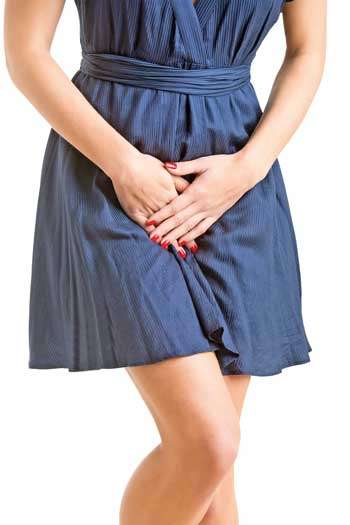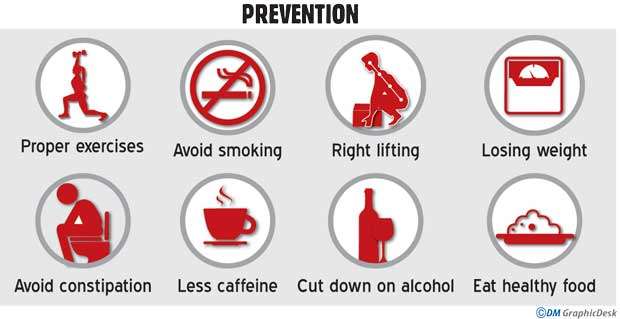03 Aug 2018 - {{hitsCtrl.values.hits}}
 Talking about the bladder is considered a topic that’s taboo. We often ignore our bladders as long as they don’t give us trouble. And when women do experience bladder problems, they often feel too embarrassed to seek help.
Talking about the bladder is considered a topic that’s taboo. We often ignore our bladders as long as they don’t give us trouble. And when women do experience bladder problems, they often feel too embarrassed to seek help.
What is urinary incontinence?
Simply it is the loss of bladder control and unintentional passing of urine. It means you leak a small amount of urine or release a lot of urine all at once. It’s a common problem thought to affect millions of people.
Who can get it
Urinary incontinence affects twice as many women as men. Certain things can increase the chances of urinary incontinence developing, including: Pregnancy and vaginal birth, obesity, a family history of incontinence and increasing of age.
Types of leaks
There are mainly two types. 
Stress incontinence – This is when urine leaks at the time when your bladder is under pressure; for example, when you cough or laugh. This is the most common type of incontinence. It is also the most common type of incontinence that affects younger women.
Urge incontinence- With urge incontinence, urine leakage usually happens after a strong, sudden urge to urinate and before you can get to a washroom.
Minor forms are:
Overflow incontinence –Which is due to chronic retention and spill out
Continuous incontinence – As explained it self-leaks through out.
Reasons for incontinence
You must understand how the body is able to keep the continence;
urine stored in the bladder. The bladder muscles tighten when you need to urinate and urine is passed through the urethra. At the same time the gate keeping muscles (sphincter) around the urethra relax to let the urine out of your body.
Incontinence can happen when the bladder muscles suddenly tighten by laughing, sneezing or exercising and the sphincter muscles are not strong enough to pinch the urethra shut.
Or it can happen due to inherent problems with in the bladder muscles and nerves giving in uncoordinated tightening which results in a leak.
Seeing a doctor
See your doctor if you have any type of urinary leak. It is not an uncommon problem and you shouldn’t feel embarrassed talking to them about your symptoms.
Doctor’s diagnosis
Your doctor will ask you about your symptoms and your medical history, including: Medicines you take, if you have ever been pregnant and what your labour and delivery experience was like.
The doctors may carry out a pelvic examination, suggest you keep a diary in which you note how much fluid you intake, type of fluid, how often you have to urinate and its volume and any accidents that you have had.

Method of diagnosis
They will go through your history examination and your urinary diary.
Your doctor may ask you to do other tests such as the following:
Treating urinary incontinence
Your doctor will ask you to do simple measures to see if they help to improve your symptoms.
Lifestyle changes –Losing weight and cutting down on caffeine and alcohol.
Pelvic floor exercises – Exercising your pelvic floor muscles by squeezing them. These exercises are taught by a specialist.
Bladder training – You learn ways to wait longer between needing to urinate and passing urine. You are guided by a specialist.
Can I do it myself?
Yes by simply practising.
Right exercises- Replace jogging and aerobics classes with Pilates. This gentle method of stretching and strengthening core muscles has become more popular as a treatment for stress incontinence. High-impact exercise puts pressure on your pelvic floor muscles and can increase leakage. Sit-ups can also cause your leak because they strain your pelvic floor muscles.
Avoid smoking- This lessens cough and bladder irritation.
Right lifting- Tighten your pelvic floor muscles before and during an act when you do lift something like picking up children or shopping bags.
Losing weight- Your BMI is a good indicator to check where you should be.
Avoid constipation- Eating more fiber can help. It may also help if you change the way you sit and use your muscles to empty your bowels.
Less caffeine- Coffee, tea, green tea, energy drinks contain caffeine, so cut down on these and replace them with water and herbal or fruit teas.
Cut down on alcohol.
Eat right food - Avoid spicy and acidic foods, such as curries and citrus fruits.
(The writer possesses an MBBS MD (OBS&GYN) MRCOG (UK) MSLCOG, has a Fellowship in Gyne laporoscopy(Akola) and is a Consultant Obstetrician
& Gynaecologist
at DGH Nawalapitiy)
And then try the following:
Medicine- Depends on what type of incontinence that you are having. It is mainly for the urge incontinence.
Surgery- Various modalities of surgeries are available mainly recommend for stress type.
Vaginal pessary- Is a small plastic or silicone device (shaped like a ring) that you put into your vagina.
Bulking agents- Type of injection given to tissues around the bladder and urethra to cause them to thicken.
You may also be offered incontinence products, such as absorbent pads and handheld urinals.
22 Dec 2024 3 hours ago
22 Dec 2024 4 hours ago
22 Dec 2024 6 hours ago
22 Dec 2024 6 hours ago
22 Dec 2024 7 hours ago